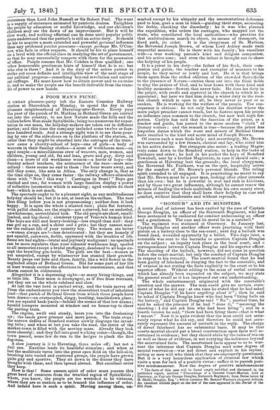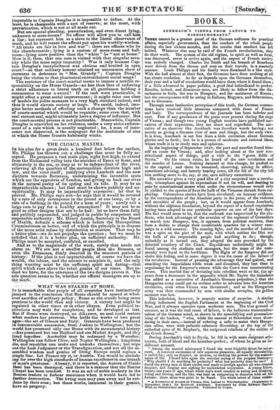" HONOUR" AND ITS MINISTERS.
A GOOD deal of interest has been excited by the case of Captain George Douglas, an officer of the Sixteenth Regiment, who has been sentenced to be cashiered for conduct unbecoming an officer and a gentleman. The case and its moral lie in a nutshell.*
The regiment was stationed at Guernsey. In January last, Captain Douglas and another officer were practising with their pistols on a battery close to the sea-coast; next day a bullock was found dead, wounded apparently by a bullet. Two days later, a constable was sent to the barracks to question Captain Douglas on the subject ; an inquiry took place in the local court, and a correspondence between Captain Douglas and his superior officer. The shooting of the bullock, however, did not come in question before the court-martial, but only the conduct of Captain Douglas in respect to his veracity. The court-martial found that he had been guilty of falsehood in denying the fact to the constable, and of evasion in not stating the facts explicitly to the court or to his superior officer. Without adding to the mass of verbal criticism which has already been expended on the subject, we may state the general result as it has impressed our own understanding.
The whole embarrassment originated with the constable's question and the answer. The man could give no certain state- ment of what he did say : at one time he stated that he had asked Captain Douglas "if he knew anything about it"; then he said be asked if Captain Douglas knew who had been "firing balls on the battery," and Captain Douglas said " No"; another time, he said he asked the prisoner if he had " done it," "meaning the shooting : I did not ask him who had been firing "; and in a fourth version he said, "there had been firing there—that is what I meant." Now it is quite evident that the man could not accu- rately repeat what he did say, and therefore he could not accu- rately represent the amount of untruth in the reply. The charge of direct falsehood has no substantial basis. It may be that courts-martial should put a broad construction upon facts well as- certained in evidence; but they should abide by the rules of reason as well as those of evidence, in not carrying the inference beyond the ascertained facts. The ascertained facts appear to us to war- rant the inference that Captain Douglas used some degree of mental reservation—was not direct and explicit in his replies ; acting as men will who think that they are improperly questioned. But it is a very hazardous application of criminal law which visits' a man for lack of a positive virtue : suffice it to punish posi- tive misdemeanour. Now the degree of positive misdemeanour * The facts of this case will be found amply unfolded and discussed in the published report, entitled " Proceedings of a General Court-Martial, held at Guernsey, on Captain George Douglas, Sixteenth Regiment; from Notes taken by H. Sholto Douglas, Esq."; which contains Mr. Samuel Warren's eloquent defence. An excellent critical paper on the law of the ease appeared in the Jurist of the 23d Jana
imputable to Captain Douglas it is impossible to define. At the least, he is chargeable with a sort of reserve; at the most, with prevarication, which is not at all made out.
But are special-pleading, prevarication, and even direct lying, unknown to mess-rooms? No officer will allow you to call him a liar ; but represent him as a slave to the literal observance of truth, and he will resent the affront put upon his worldly-wisdom. "All tricks are fair in love and war": there are officers who lie like chambermaids ; lying is a custom of mess-room and ball- room—lying more positive than the "white" lie "not at home." How is it, then, that one case is visited with that singular seve- rity while the mass enjoy impunity? Was it only becaase Cap- tain Douglas's inexplicitness was obvious and bruited in open court?--so -that military honour attained an uncommon show of sternness in deference to " Mrs. Grundy " ; Captain Douglas being the victim to that pharisaical encroachment social usage ?
The sentence of the court-martial seems to impose a terrible re- sponsibility on the Horse Guards—no less than that of enforcing a strict adherence to literal truth on all gentlemen holding a commission to wear a sword t If the task were practicable, it might effect a great social improvement ; it might raise one class of models for polite manners to a very high standard indeed, and thus it would elevate society at large. We could, indeed, ima- gine better methods of effecting such a change than the number of courts-martial which would be requisite; some even that, with real earnest zeal, might ultimately have a degree of influence. But the court-martial process is not practicable. Meanwhile, Captain Douglas is convicted on lax evidence, under a very strict enforce- ment of a rule which is usually neglected ; he, a man of inno- cence not disproved, is the scapegoat for the multitude of sins at which the Horse Guards habitually winks.

























 Previous page
Previous page